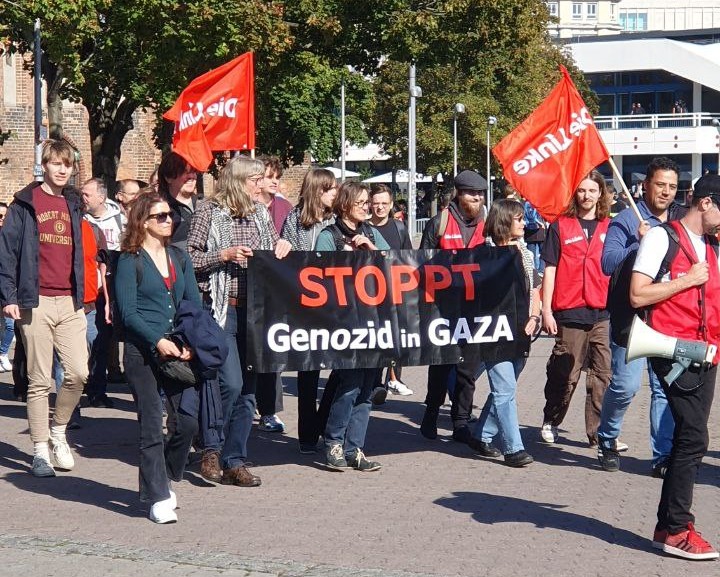On Sunday, May 7, the elections for representatives to the Constitutional Council took place in Chile. The Republican Party of Chile obtained the majority vote, with 35.41% of the votes, and 23 elected representatives out of a total of 50. The party founded, in June of 2019, embodies a contemporary version of Pinochetism. Behind them Unidad Para Chile [1], took 28.59% of the votes, and 16 representatives. Finally, the “traditional” right wing, united under the Chile Seguro [2] pact, reached 21.07% of the vote and 11 elected representatives. The “extreme center” of the Todo por Chile [3] coalition and the right-wing populist People’s Party received a low vote share. Finally, a representative of the indigenous peoples, elected to a reserved seat, integrates the Constitutional Council.
There was a significant increase in spoiled votes, amounting to 16.98% (equivalent to 2,119,506 votes) – previously 3.03% of spoiled votes (187,819) . Why? Some propose that these represent individuals who likely supported the proposal for a new Constitution (September 2022 plebiscite).
The mobilization favouring the invalid vote, involved ex-conventionists, parliamentarians, social organizations, and grassroots activists. A spoiled vote serves to uphold a critical perspective of the process and lay the groundwork for an impeachment. Particularly during the forthcoming exit plebiscite where individuals will cast their vote either “for” or “against” the second constitutional draft.
Previously, we addressed this process following the defeat of the Constitutional Convention (September 4, 2022 plebiscite). But these electoral results show a predominant control and oversight by political parties, to exclude key actors who played a significant role in the October 2019 mobilizations and, those who participated in the Constitutional Convention. Non-party political activists and social movements were excluded from this new process.
Following the rejected new constitution those with parliamentary representation robustly debated how to address the 2019 constituent momentum. In December 2022, the Agreement for Chile outlined the new process. It entails an Expert Commission, appointed by Congress to draft the constitution based on 12 defined foundations. It establishes a Constitutional Council consisting of 50 elected representatives. Unlike previously the current process only permits discussion of political parties.
This Constitutional Council reviews and votes on the already written draft. Then a Technical Committee on Admissibility, appointed by Congress, forms a meta-constitutional court. It reviews the text to ensure adherence to the 12 foundations defined in the Agreement for Chile.
Between September and December 2022 a strong opposition of the Republican Party, was led by José Antonio Kast, against a new constitutional process. How is it possible for the main opponent of an institution to secure an almost absolute majority of its seats?
Pinochet’s Constitution and the current crossroads
The results of May 7, are a strong blow to the government, which has acknowledged this. They affirm that they will maintain the course of their program. They aim to isolate the Republican Party by appealing to the “democratic” and “dialogue-oriented” nature of the traditional right-wing parties within the Chile Vamos coalition (UDI, RN, Evopoli). On the other hand, the Republican Party still does not know what to do with its new toy and faces attacks from all political sectors. They are accused of sexual abuse and invited to “avoid making the same mistake we made,” as President Boric stated. Boric was referring to the alleged lack of dialogue by the left in the Constitutional Convention. The Republican Party attitude was predictable.
Luis Silva, a lawyer and member of Opus Dei, who received the highest number of votes stated that he has “no fear of disagreement. That’s what votes are for. And if they don’t have them, they have to leave the square. And if not, we call upon the public force, because that’s what it’s there for, to enforce the law. Otherwise you end up dancing to the tune of the left”. With openly anti-left and anti-feminist rhetoric, the Republican Party articulated a novel political and ideological influence over the political right and its social bases. At their core lies an authoritarian, repressive, socially conservative Christian, and xenophobic nationalist project.
One staple of the constitutional struggle in recent years was denunciation of the “Pinochet constitution.” This phrase highlighted illegitimate approval during the dictatorship and its neoliberal content. Unfortunately, its illegitimate origin weighed more heavily than its content. As reflected in statements by Minister of Women, Antonia Orellana, that having “the new Constitution crafted in a democratic setting… is valuable in itself.” Undoubtedly, a constitution born out of a dictatorship carries illegitimacy. However, the dictatorship’s motivation for a new constitution was not to seek legal validation, but to dismantle the democratic, republican, and progressive avenues of the previous 1925 Constitution. Above all, its intent was to pre-empt eradicate any resurgent transformative constituent movement with a socialist vision. The 1980 constitution was Pinochet’s “never again”. Never again would the people be allowed to organize, never again would a revolutionary left find its voice, and never again would the working class have a path to power.
Currently the dilemma is that the new constitution could end up worse than the Pinochet-era constitution, placing constituent sectors in an unfavorable position. The new constitutional councilor, Luis Silva (Republican), stated that “The government faces a major problem because if they call for approval, they will be endorsing a right-wing constitution. If they call for rejection, they will be stuck with the very constitution they wanted to change. And what will happen is that in either of these scenarios, once they are no longer in power, they will take to the streets demanding a new constitution. And if we Republicans are in government, I will tell them to go to hell.”
Some hypotheses to understand and regain the initiative
How did we get here, and how could we move forwards from the left? I highlight some hypotheses to explain the scenario and possible paths to regain the initiative.
1 It was a mistake for the government and its parties to push for a new constitutional process. It opened the door to a victory for the right. Since 2021, a radical shift in popular concerns occurred, from socio-political issues of the constituent uprising to individual and family survival concerns within the context of the pandemic lockdown. This, in part, could explain the outcome of the plebiscite.
2 The political hegemony of the right comes from a government that backtracked on its program, adopting elements of the right-wing agenda. Alongside the shift in popular concerns, the right launched an offensive in the media and parliament to place safety and migration at the center of public debate, especially following the deaths of three police officers. This offensive led the government and the ruling coalition to a narrative and legislative work that was only a sell-out. Adopting a narrative criminalizing poverty and migration, they supported strengthening police repression. They authorized the use of firearms by the police who merely perceived threat. This “license to kill” has already claimed its first victims and, was used to overturn convictions of state agents guilty of human rights violations. The government justified its programmatic retreats based on the difficult balance of power, and placating the forthcoming discussion of tax reform to finance their expanded social rights program. However in March, Congress rejected the proposed reform. It begs the question, what sense does it make to grant legislative space to the right in exchange for parliamentary votes that will never materialize?
3 The process of polarization continues to deepen. Traditional sectors of the “center-right,” the center, and the “center-left” have lost political leadership, unable to offer an alternative. In the recent election, the center collapsed, represented by those who stubbornly refuse to acknowledge the reality of a crisis and cling to the post-dictatorship neoliberal administration, which was fiercely contested by the 2019 uprising.
The emergence of a counter-revolt in the “Rechazo” (Rejection) led by the far-right shows that reactionary sectors have caught up, seeking to hegemonize the terms of the political struggle with lies, provocations, and threats. These efforts have had electoral results, at least among the poorest sectors. There migration and security are the main issues and there is a higher concentration of evangelical influence.
4 The chapter of October 2019 is far from closed. The political crisis continues to unfold, no actors able to overcome stagnation. With the weakness of progressives, apparently only pinochetismo can fulfill the state policies desired by capital in Chile. This means the precarization of life to weaken the value of labor, military containment of social instability, unlimited expansion of the primary-export matrix, and governing by brute force in the face of ineffective parliamentarism. This the normalization of pinochetismo. The government made overtures to the traditional right outside of the Republican Party, labeling it as the “democratic right” to open lines of legislative dialogue. The problem is that instead of dividing the right to weaken it, it grants political legitimacy to a sector that shares the social and political project of the Republican Party.
5 The radicalization of the right and the drift of progressivism create an opportunity for transformative left-wing politics. However, a transformative alternative is not to appeal to the current common sense (formerly progressive and constitutional, now punitive and republican), but rather one willing to shake up the crisis. This by placing at center the immediate needs of the working, precarious, indebted population, offering the middle-class sectors a way out with universal policies, and breaking radically with big capital.
6 Unity to build a viable left-wing alternative cannot be guided solely by moral compass, it must be guided by the compass of warfare. No revolutionary project for Chile is possible without a feminist mass leadership. Feminism offers the best possible solution to “identity politics” because it overcomes the hidden identitarianism within misogynistic left-wing leadership. The universality of feminism is concrete and revolutionary. No new left is possible without the communist family, without the radical left, without the grassroots organizations, without the middle-level leadership of the labor movement, without university intellectuals (from working-class or middle-class backgrounds). In tactical terms, it is impossible to confront the extreme right unless a total tactical complementarity is embraced. We need to engage in all battles: the struggle for demands, self-managed and cooperative construction, institutional and electoral disputes. “He who desires the ends, desires the means,” as an old revolutionary used to say.
7 The first point of a new program must be to reclaim wealth monopolized by capital. It can no longer be solely about social rights financed through the same level of distribution between capital and labor, or targeted social spending programs funded by austere fiscal coffers. Mere redistribution fails if it does not confront profits. A tragic decision comes: either an increasing expropriation of illegitimate capital gains or a deepening cycle of extermination of the working class. This does not arise from ideological desire of the left, but from the actuality of our stagnant low productivity economies. The private sector is simply incapable of investing in sectors to revitalize growth in a beneficial direction for the entire population. Without expropriatory policy, that is, reorganizing work to increase the wage share and significantly transferring economic activity to the public sector, it is impossible to envision a transition towards the type of eco-social development we need to overcome the ecological crisis while ensuring a dignified life for our people.
Footnotes
1 “Unity for Chile”, coalition formed by Acción Humanista (Humanist Action), Comunes (Commons), Convergencia Social (Social Convergence), Federación Regionalista Verde Social (Regionalist Social Green Federation), Partido Comunista (Communist Party), Partido Liberal (Liberal Party), Partido Socialista (Socialist Party), and Revolución Democrática (Democratic Revolution).
2 “Safe Chile”, coalition formed by the Unión Demócrata Independiente (Democratic Independent Union), Renovación Nacional (National Renewal), and Evópoli.
3 “Everything for Chile”, coalition formed by the Democracia Cristiana (Christian Democracy), Partido por la Democracia (Party for Democracy), and Partido Radical (Radical Party).
Translated from the Spanish by Rafaela Apel Marcel




